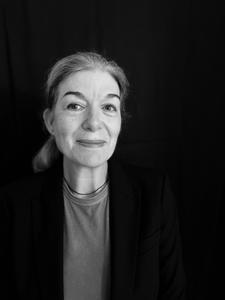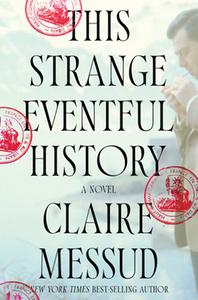
|
|
| Claire Messud (photo: Lucian Wood) |
|
Claire Messud is the author of nine books, including The Emperor's Children, The Woman Upstairs, and The Burning Girl. In 2020, she published the essay collection Kant's Little Prussian Head & Other Reasons Why I Write, which focused on her peripatetic upbringing as the daughter of a Canadian mother and a pied-noir father of Algerian descent. She returns to this material in This Strange Eventful History (reviewed in this issue), a sprawling multigenerational saga that follows a family like her own from 1940 to 2010.
What inspired you to return to your family's history in fiction, rather than essays?
There are several pieces in Kant's Little Prussian Head about my family, but in my mind they didn't begin to explore what that generation's lives were like. My second novel, The Last Life (1999), was in some ways my first approach to family material--it's not autobiographical, but it's about a family of French colonials, or pieds-noirs, after Algerian independence. We all write out of our experiences (even when writing fictions set on other planets or in other centuries), and the themes of life and of my family's history have been with me since I started out. It feels as though there's always more to discover; I'm not sure I have any conclusions, though.
Every chapter in the book is in third person except for those from the perspective of François and Barbara's younger daughter, Chloe. Why did you choose to present her chapters in this style?
The novel, in my mind, proceeds from a more traditional storytelling form in the earliest sections to an increasingly interior narrative, whether in third or first person. It seemed to me necessary that the first person should break into the novel about halfway through--it happens in the fourth decade of seven--so hopefully readers understand that while there are numerous subjectivities involved, one of them is more intimate, situated in a particular place in time and in a particular relation to the other characters.
 Could you talk about the link between family and world histories?
Could you talk about the link between family and world histories?
Yes, absolutely--the book is about the interconnectedness of our small personal lives and the big historical events always unfolding around us. The title comes from Jaques' famous soliloquy in As You Like It: "All the world's a stage, and all the men and women merely players...." As I considered my own family's history, I was aware that in the 20th century, everyone's life, however small and broadly insignificant, intersected repeatedly with History--wars and displacements, colonialism and decolonization, constant upheaval and migration. (This of course describes the 21st century equally well!) So I'm following a small group of people, a particular family, in their meanderings through the strange, eventful history of the 20th century--and yet one could focus on almost any person or people and bump up against the greater forces of the era. Our lives are shaped by these external forces--there's no escaping History.
Do you have thoughts you'd like to share regarding religion and its role in shaping strange, eventful histories?
Yes, some of the characters in the novel are devoutly religious--not just Denise but Gaston and Lucienne, whose devotion shapes everything in their lives--while others are committedly secular. Religion is for the grandparents' generation a great solace, a helpful structure. In wartime, in poverty, when they're separated, when they're lost--Gaston and Lucienne trust in God's plan. (I can't tell you how often God is invoked in my grandparents' correspondence.) This is a bulwark that the secular don't have, of course; the world looks very different without faith. But faith is also, as we know, itself responsible for many terrible things, for war and oppression and so on. My aim was simply to try to convey the very different experiences people have of the same events, depending on many factors, including one's attitude towards religion.
In the passage in which Mrs. Fisk makes derisive comments about Aborigines, Chloe and her sister, Loulou, tell her about the myth of the Rainbow Serpent, thought of as a god to Aboriginal Australians. Mrs. Fisk responds, "Aren't their myths fascinating? Who'd like a Life Saver?" Can you talk about the role of myth in histories, both those of a country and those that emerge within a family, and their possible intersection?
I wanted to convey, there, the indifference with which this older, white Canadian woman meets the stories of the native Australian peoples. Chloe, learning these myths at school at the same time as she learns Bible stories, grasps that there are differing foundational myths (the Rainbow Serpent and, say, Adam and Eve, or Jesus Christ) and to her, they're equally valid: she isn't quite able to differentiate between the traditions. Her grandmother, on the other hand, limited and formed by her particular education and beliefs, believes the Bible stories to be, if not literally true, then at least spiritually true, while she considers the myths she's not familiar with to be merely quaint stories.
We're all shaped by internalized beliefs of which we're not even aware--and some, of course, that we see more clearly, and call into question. Individuals and generations adopt different sets of myths--the American dream, for example, is one that sustained generations of Americans and determined a lot of people's life choices; but now, perhaps, people have lost faith in it. Indeed, broadly, culture is formed in myth, in beliefs the provenance and veracity of which are unclear--even as, as a character wisely observes in an Anthony Powell novel, "It's not what happens, it's what you think happens, that matters."
What are your thoughts on the role of cinema in shaping perceptions of other countries, other religions, and so on?
I know from reading family letters from the 1950s and 1960s that, while my Canadian grandparents acquired a TV in the late '50s, my French grandparents didn't have one. Instead, for entertainment they went every weekend to the movies, shows that started with the newsreels followed by one or two features. Cinema was a massive part of their lives; and of course, as I tried to convey in the novel, a lot of the movies they were seeing--in French North Africa, or in Argentina or later, when I was a kid in Australia--were Hollywood movies. The influence of American cinema through the 20th century and into the 21st is of course massive--that's a significant part of the cultural imperialism of which so many other nations have complained, and complain still. I think it's perhaps hard for Americans to understand how much power these narratives--these myths of America, if you will!--have had outside the USA over the past century.
The multigenerational family saga is one of the oldest and most enduring styles in literature. Do you have any favorite works from that genre, and did any previous family sagas influence you as you wrote this book?
There are so many multigenerational novels that I love--from Thomas Mann's Buddenbrooks or Tolstoy's War & Peace to Gabriel García Márquez's One Hundred Years of Solitude, Min Jin Lee's Pachinko or There, There by Tommy Orange--and many more. I believe we're as much unconsciously influenced by what we've read as we are consciously--so I'll claim influence from all of them! --Michael Magras

